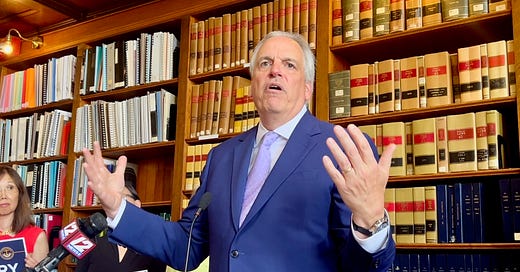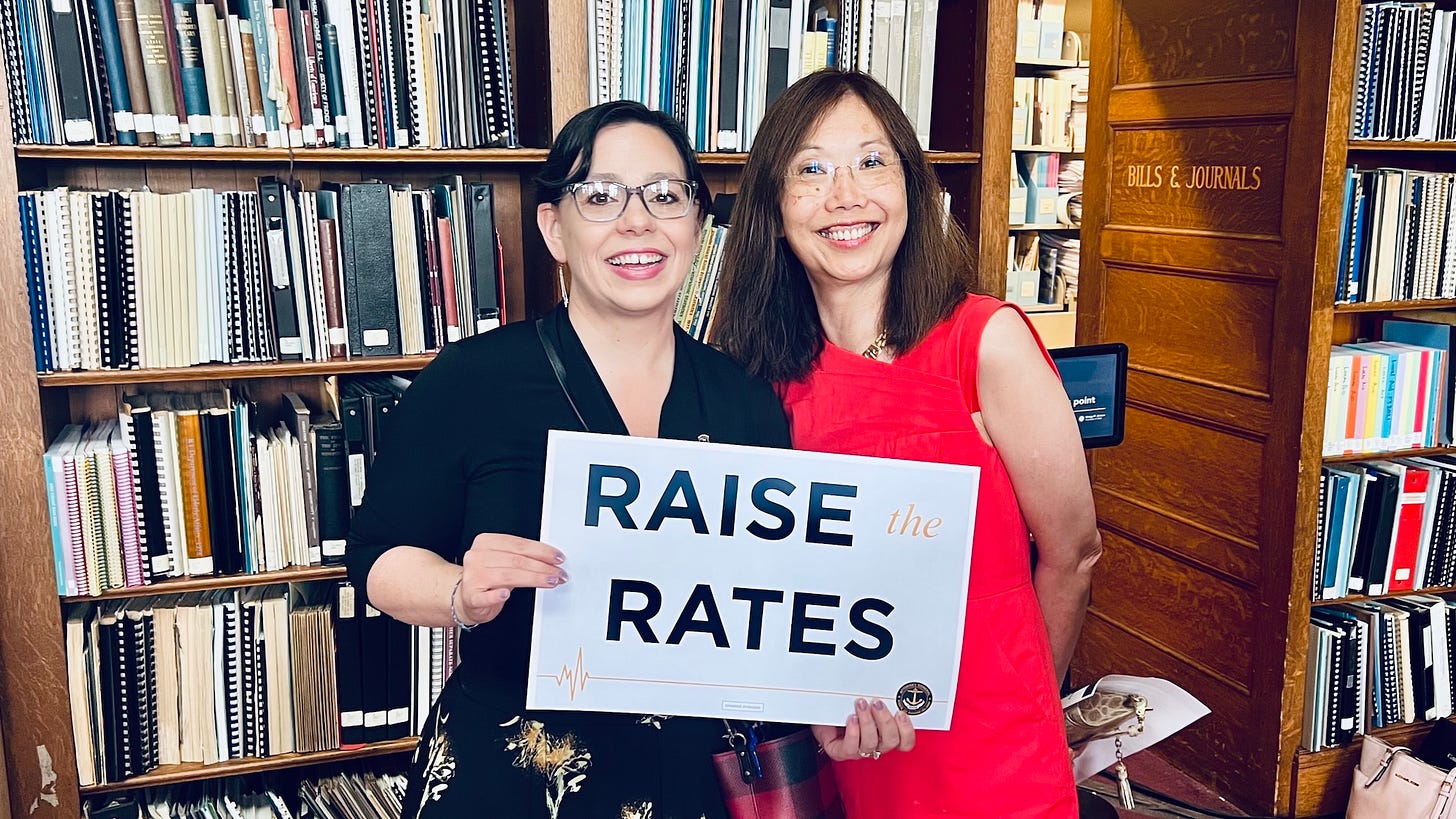Attorney General Neronha hosts State House rally in support of raising Medicaid reimbursement rates
“The problem is that we don’t have enough revenue coming into the system,” said Attorney General Neronha. “The reimbursement rates in Rhode Island are too low."
“We have chosen to ensure 300,000 plus working men and women and children in Rhode Island, and that’s the right decision because it keeps costs down and it’s the right thing to do, but we have not made the commitment to pay for it,” said Rhode Island Attorney General Peter Neronha. “And as long as we refuse to pay for it, they won’t get what they need and deserve.”
The Attorney General was speaking at a rally in the Rhode Island State House Library on Thursday in support of his office’s legislation to immediately increase Medicaid reimbursement rates for primary care providers. By promoting consistent reimbursement for primary care professional services across Medicaid and Medicare, the legislation seeks to address barriers to primary care, thereby improving health equity in the State.
Currently, Medicaid reimburses healthcare providers at 37% of the rate that Medicare does, and private insurers reimburse healthcare providers at 200% of the Medicare rate. The Attorney General’s office has submitted legislation, H6373, that would bring parity to Medicaid and Medicare rates by requiring the Executive Office of Health and Human Services (EOHHS) to “increase Medicaid payment rates for primary care services furnished by primary care providers to be commensurate with Medicare rates.” The legislation would also require EOHHS to “ensure equivalent rate adjustments are made available to providers participating in Medicaid managed care organizations, Medicaid accountable entities, and community health centers.” State Representative Megan Cotter (Democrat, District 39, Exeter, Hopkinton, Richmond) sponsored the bill in the House.
The Attorney General’s rally targets just one part of his comprehensive plan to restructure healthcare in Rhode Island and protect the state from a cataclysmic collapse of our healthcare system. Last week, the Attorney General outlined his ideas, which, in addition to increasing Medicaid reimbursements, also aim to eliminate prior authorizations and explore the possibility of single-payer healthcare in the state. The office is also suing the three largest Pharmacy Benefit Managers (PBMs) in the country.
“Primary care is in trouble,” said Dr. Kate De Klerk. “There are not enough primary care providers in Rhode Island, and practices are struggling to keep their doors open. We need over 250 more full-time primary care providers to adequately meet the population’s needs in Rhode Island. Think about that. It will be a challenge to maintain the status quo if practices like Anchor Medical continue to close and our neighboring states succeed in paying their primary care providers more, luring our providers across state lines.
“Primary care is in an unstable place, and many of us are profoundly disheartened by the lack of response to the crisis,” continued Dr. De Klerk. “Reading the Attorney General’s proposal was the first time in many months that something gave me a feeling of hope. Corporate profiteering and underinvestment in primary care are deeply embedded in our healthcare system, and only through bold and decisive action, such as the proposals made by the AG’s office, will we be able to steer the ship and stabilize primary care.”
“We see a healthcare system in critical condition and quickly running out of time before it implodes,” said United Nurses & Allied Professionals (UNAP) President Lynn Blais. “We have two of our hospitals on the verge of closing. We have extensive wait times in our emergency rooms, with patients waiting days for treatment because we lack inpatient beds. Patients are waiting weeks to get tests and exams scheduled. Patients are not receiving the care they deserve because our healthcare workers and physicians are crossing state lines to Connecticut and Massachusetts for better pay and benefits. This legislation is the first step to help repair the state’s failing healthcare system.”
“This proposal by the Attorney General to increase Medicaid payment rates to better support our primary care colleagues is crucial to sustaining our primary care practices’ access to healthcare and ultimately the health of all Rhode Islanders,” said Dr. Beth Cronin, Rhode Island section chair for the American College of Obstetrics and Gynecology. “Currently, the primary care reimbursement rates do not cover the cost of actually providing the care that happens in the office.
“We need to improve reimbursements so that our primary care colleagues can keep their staff paid, their lights on, and their doors open. This isn’t about the individual physician making more money. This is about keeping our system financially feasible.”
“There’s got to be a better way to do this system,” said Rhode Island AFL-CIO President Patrick Crowley. “I think everyone in this room knows what’s going on right now at Butler Hospital, and if you haven’t had the chance to get down to 345 Blackstone Boulevard, do it. Talk to a frontline worker. Talk to one of the nurses, CNAs, technicians, or anyone else who knows what it’s like to work in an environment that is chronically underfunded, and who is treated as if it’s second, third, fourth class work, and is always scrambling for every dime, nickel, and penny to do the things that they know their patients need.
“It shouldn’t be that way. It doesn’t have to be that way, and we have the power to change it. I’ve got to tell you, my members are sick and tired of working in an environment that makes them sick and tired. We’re going to see more disruptions. We’re going to see more picket lines. That’s not a threat. It’s a promise - because our members are tired of it.”
“The problem is that we don’t have enough revenue coming into the system,” said Attorney General Neronha. “The reimbursement rates in Rhode Island are too low. They’re too low relative to our neighboring states, and we know that there are only three ways healthcare gets paid for: Medicaid, Medicare, or commercial insurance. We’re lower in all three of these areas compared to our neighboring states.
“The bottom line is we can raise our rates. We know we can do it. We can find the money,” continued Attorney General Neronha. “Someone told me the fiscal note is $30 million on a $14.2 billion budget. We can find $30 million to ensure every single Rhode Islander has access to a primary care doctor who can manage their care. So let’s look. There are receptive voices in this building. They can carry this ball over the finish line.”
Due to federal matching funds, that $30 million investment will bring $190 million into Rhode Island’s healthcare system.
See also: Attorney General Neronha announces series of actions to address health care crisis
Here’s the video:






Thanks for the coverage. I couldn’t make it there. Go AG!
We need to invest in primary care. Too much of the state's money goes to help only those parts of the medical industrial complex that contribute the most to the rising cost of healthcare. But primary care saves a lot more lives than the places the state is putting its money. Lets do this.